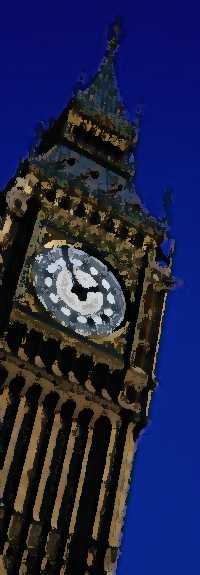|
Destruction of Sennacherib, The
|
| |
| |
The Assyrian came down like
the wolf on the fold,
And his cohorts were gleaming in purple and gold;
And the sheen of their spears was like stars
on the sea,
When the blue wave rolls nightly on deep Galilee.
Like the leaves of the forest when Summer is green,
That host with their banners at sunset were seen:
Like the leaves of the forest when Autumn hath blown,
That host
on the morrow lay withered and strown.
For the Angel of Death spread his wings on the blast,
And breathed in the
face of the foe as he pass'd,
And the eyes of the sleepers wax'd deadly and chill,
And their hearts but once heaved,
and for ever grew still!
And there lay the steed with his nostril all wide,
But through it there roll'd not the breath
of his pride;
And the foam of his gasping lay white on the turf,
And cold as the spray of the rock-beating surf.
And
there lay the rider distorted and pale,
With the dew on his brow, and the rust on his mail:
And the tents were all
silent, the banners alone,
The lances unlifted, the trumpets unblown.
And the widows of Ashur are loud in their wail,
And the idols are broke in the temple of Baal;
And the might of the Gentile, unsmote by the sword,
Hath melted
like snow in the glance of the Lord!
| |
|
|
 |
|
Thou Whose Spell Can Raise the Dead
|
| |
| |
Thou whose spell can raise
the dead,
Bid the prophet's form appear.
"Samuel, raise thy buried head!
"King, behold the phantom seer!"
Earth
yawn'd; he stood the centre of a cloud:
Light changed its hue, retiring from his shroud.
Death stood all glassy in
the fixed eye:
His hand was withered, and his veins were dry;
His foot, in bony whiteness, glitterd there,
Shrunken
and sinewless, and ghastly bare;
From lips that moved not and unbreathing frame,
Like cavern'd winds the hollow acccents
came.
Saul saw, and fell to earth, as falls the oak,
At once, and blasted by the thunder-stroke.
"Why is my
sleep disquieted?
"Who is he that calls the dead?
"Is it thou, Oh King? Behold
"Bloodless are these limbs, and
cold:
"Such are mine; and such shall be
"Thine, to-morrow, when with me:
"Ere the coming day is done,
"Such
shalt thou be, such thy son.
"Fare thee well, but for a day,
"Then we mix our mouldering clay.
"Thou, thy race,
lie pale and low,
"Pierced by shafts of many a bow;
"And the falchion by thy side,
"To thy heart, thy hand shall
guide:
"Crownless, breathless, headless fall,
"Son and sire, the house of Saul!"
| |
|
|
